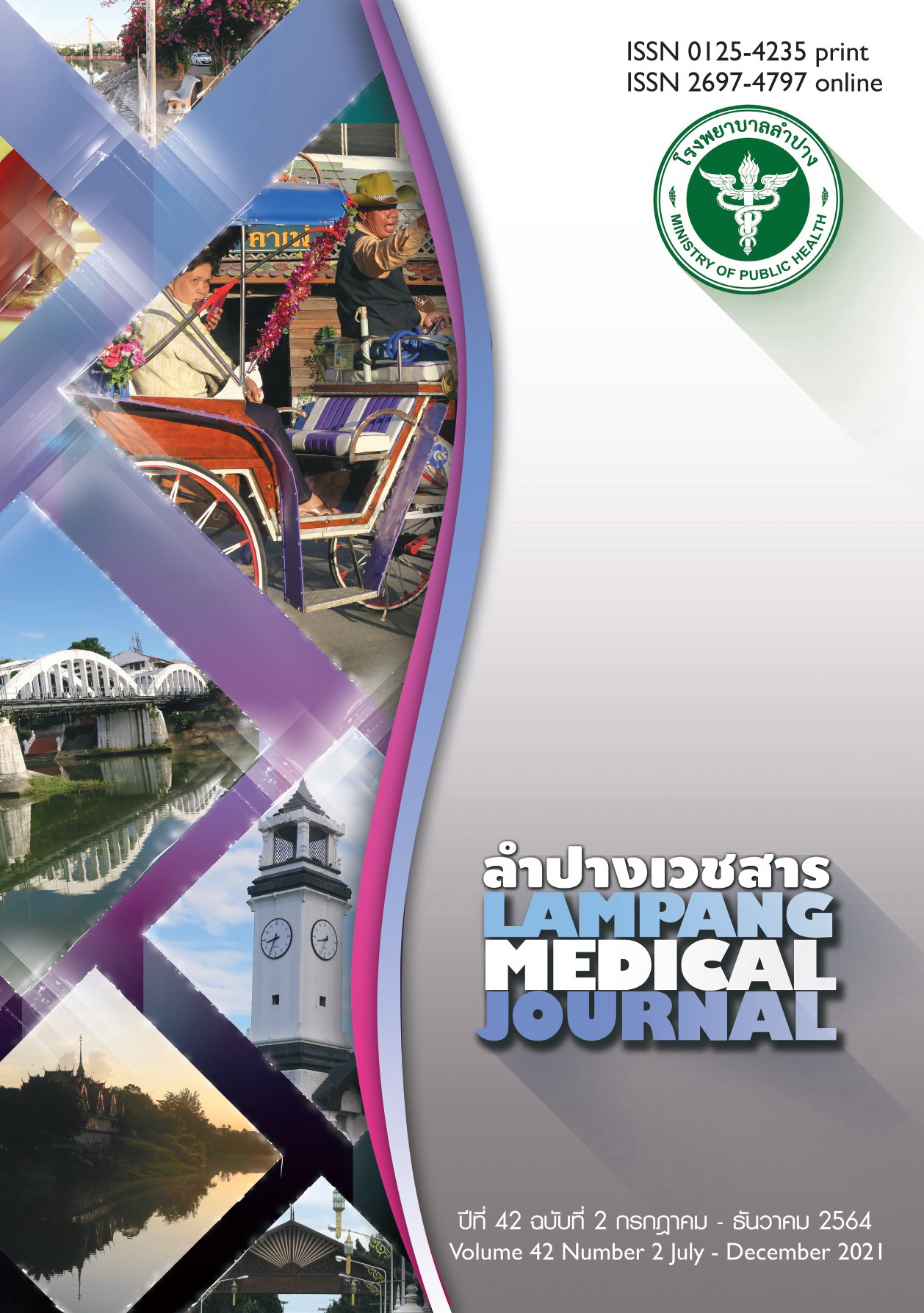Background: Most preterm infants have difficulty in oral feeding. Occupational therapists play an important role to stimulate their sucking – swallowing skills.
Main Article Content
Abstract
Background: Most preterm infants have difficulty in oral feeding. Occupational therapists play an important role to stimulate their sucking – swallowing skills. Training duration to achieve full oral feeding depends on both internal and external factors. No previous study had focused on this issue in Thai infants.
Objective: To determine internal factors correlating with the training duration to achieve full oral feeding of premature infants.
Material and method: A cross-sectional study was conducted among 20 preterm infants who underwent training for sucking-swallowing skills and oral feeding at Occupational Therapy Division, Lampang Hospital from January 2019 to December 2020. Oral reflexes and Feeding Readiness Behaviour (FRB) score were assessed. Duration from training initiation to achieving full oral feeding was recorded. Correlation between the training duration and FRB scores, chronological age at initiating oral feeding, gestational age, maternal age, oral reflexes and comorbidities were analyzed using Pearson correlation coefficient and point biserial correlation coefficients.
Results: Most of infants were female (n=13). The mean gestational age was 30+4 weeks (SD 3+4, range 25–36). The median birth weight was 1,290 gram (IQR 1,163 , range 730–3,130) and age at initiating oral feeding was 60 days (IQR 60, range 3–180). Comorbidities were respiratory distress syndrome 14 cases, patent ductus arteriosus 11 cases and bronchopulmonary dysplasia (BPD) 9 cases. The mean FRB score was 10.6 (SD 1.1, range 8–12) and the median training duration was 9 days (IQR 7, range 3–43). All infants achieved full oral feeding prior to discharge. There were negative correlations between the age at initiating oral feeding and FRB score (r= -0.667, p=0.002) and gestational age (r= -0.587, p=0.007). The training duration to full oral feeding positively
correlated with the age at initiating oral feeding (r=0.849, p=0.001) and BPD (r=0.538, p=0.014), but negatively correlated with FRB score (r=-0.806, p=0.001).
Conclusion: The transition time from gavage to full oral feeding in premature infants positively correlated with the age at initiating oral feeding and BPD, but negatively correlated with FRB score.
Article Details

This work is licensed under a Creative Commons Attribution-NonCommercial-NoDerivatives 4.0 International License.
บทความที่ส่งมาลงพิมพ์ต้องไม่เคยพิมพ์หรือกำลังได้รับการพิจารณาตีพิมพ์ในวารสารอื่น เนื้อหาในบทความต้องเป็นผลงานของผู้นิพนธ์เอง ไม่ได้ลอกเลียนหรือตัดทอนจากบทความอื่น โดยไม่ได้รับอนุญาตหรือไม่ได้อ้างอิงอย่างเหมาะสม การแก้ไขหรือให้ข้อมูลเพิ่มเติมแก่กองบรรณาธิการ จะต้องเสร็จสิ้นเป็นที่เรียบร้อยก่อนจะได้รับพิจารณาตีพิมพ์ และบทความที่ตีพิมพ์แล้วเป็นสมบัติ ของลำปางเวชสาร
References
มนตรี ตู้จินดา, วินัย สุวัตถี, อรุณ วงษ์จิราษฎร์, ประอร ชวลิตธำรง, พิภพ จิรภิญโญ, บรรณาธิการ. กุมารเวชศาสตร์ เล่ม 1. กรุงเทพฯ: โรงพิมพ์เรือนแก้วการพิมพ์; 2540.
การประชุมคณะทำงานขับเคลื่อนและบูรณาการภารกิจด้านการพัฒนาสุขภาพสตรีตั้งครรภ์และเด็กปฐมวัยเขตสุขภาพที่ 1; วันที่ 27 พฤศจิกายน 2563; ณ ห้องประชุมกาสะลอง ศอ. 1 จังหวัดเชียงใหม่. เชียงใหม่: สำนักงานหลักประกันสุขภาพแห่งชาติ เขต 1; 2563.
พรรณรัตน์ แสงเพิ่ม. ศูนย์ส่งเสริมการเลี้ยงลูกด้วยนมแม่และสุขภาพเด็กปฐมวัย. Breastfeeding & the special care baby [อินเทอร์เน็ต]. นครปฐม: คณะพยาบาลศาสตร์ มหาวิทยาลัยมหิดล; 2021 [เข้าถึงเมื่อ15ธ.ค.2564]. เข้าถึงได้จาก: http://ns.mahidol.ac.th/breastfeeding/articles/breastfeeding_special_ care.html
White-Traut R, Pham T, Rankin K, Norr K, Shapiro N, Yoder J. Exploring factors related to oral feeding progression in premature infants. Adv Neonat Care. 2013;13(4):288-94.
ชุติวรรณ แก้วไสย, ผกาวรรณ สุทธิวงศ์, ดวงพร จองพิพัฒนพงษ์. คู่มือการฟื้นฟูสภาพในกิจกรรมการรับประทานอาหารสำหรับเด็กพิการทางสมอง. พิมพ์
ครั้งที่ 2. กรุงเทพฯ: โรงพิมพ์ชุมนุมสหกรณ์การเกษตรแห่งประเทศไทย; 2552.
Kumari N, Jain A, Ramji S. Prediction of nutritive 62 ลำปางเวชสาร ปีที่ 42 ฉบับที่ 2 กรกฎาคม - ธันวาคม 2564 sucking in preterm babies (<34 weeks) and preterm sucking readiness scale. Matern Health Neonatol Perinatol. 2019;5:18.
Mizuno K, Nishida Y, Taki M, Hibino S, Murase M, Sakurai M, et al. Infants with bronchopulmonary dysplasia suckle with weak pressures to maintain breathing during feeding. Pediatrics. 2007;120(4): e1035-42.
Hwang YS, Ma MC, Tseng YM, Tsai WH. Association among perinatal factors and age of achievement of full oral feeding in very preterm infants. Pediatr Neonatol. 2013;54(5):309–14.
Osman A. Oral feeding readiness and premature infant outcomes. Journal of Neonatal Nursing. 2019;25(3):111–5.
Griffith T, Rankin K, White-Traut R. The relationship between behavioral states and oral feeding efficiency in preterm infants. Adv Neonat Care. 2017;17(1):E12–9.
White-Traut RC, Berbaum ML, Lessen B, McFarlin B, Cardenas L. Feeding readiness in preterm infants.
MCN Am J Matern Child Nurs. 2005;30(1):52–9.


